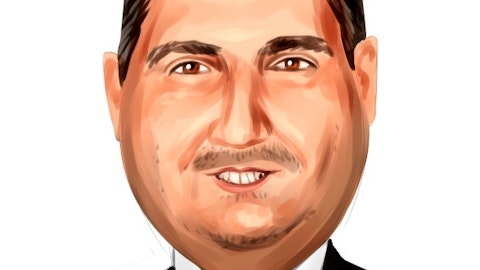Bill Rutherford: Well, when I think about that, when I look at the rate, it’s based on where we perform them in our view of the position going forward. We do expect continued improvement in the labor market. But as I said, I think as a percent of revenue, we hold, I think the margin profile overall for the second half of the year will be slightly better than the margin profile we saw in the first half of the year. And that, all in all, has contributed to the guidance raise. I remind you, we’ve raised our guidance almost the midpoint of our EBITDA guidance, roughly $450 million from where we turn the calendar. So I think all that’s reflective in our considerations right now.
Sam Hazen: Yes. And Bill, let me add a point here. I think it’s a relevant point. Obviously, we’ve dealt with a fairly unprecedented labor market over the last 3 years or so. And we do believe, as Bill indicated earlier, it’s moderating. We’ve also dealt with sort of an unprecedented hospital-based physician dynamic at a macro level. And if you just take a snapshot of where we are 6 months into this year versus where we were pre-pandemic when neither of these macro forces were in place, we’ve actually increased our margins by comparison to 2019. So I think it’s sort of a testament to the ability of the company to adjust operationally to dynamics and continue to move forward with our strategy. As we’ve mentioned before, we think our competitive positioning has improved compared to where we were pre-pandemic.
Our market share has also improved during that time period. So we continue to believe that the company has the wherewithal to adjust to these factors, continue to move ahead in a very positive way and generate the results that we all want.
Operator: And your next question comes from Ann Hynes with Mizuho Group.
Ann Hynes: I know it’s early, but do you have any observations on how Medicaid determinations is impacting your business? I know one of your bigger states, Texas, started early. It sounds like it’s been a little bit messy. So any early observations? And can you remind us if you have anything from the KB determinations in your guidance? And do you think this process is going to be an overall positive or negative for HCA?
Bill Rutherford: Yes. Thanks for that. It’s a good question. And you’re right, it is still early, and we’ve got a pretty organized approach to not only continue to watch the market but respond on there. So we haven’t seen any negative or any material impact on this today. We think what we’re seeing many of the patients who are receiving determination, that there’s some opportunity to continue to get them reenrolled in Medicaid, some of them are more technical. They either didn’t complete an application or some other aspect of that. So our teams are trying to identify those individuals as best they can, assist them in gaining coverage, which remain encouraged by many of the studies that the people are being redetermined off, who will qualify either for coverage in an employer sponsor plan or qualify for coverage in the health insurance marketplace.
And so we’ll continue to watch that as that unfolds. But no impact right now. Nothing in our guidance is assumed for Medicaid redetermination. We believe over the long run, there could be some positive trends from this but we’ll just have to wait to see how that plays out.
Operator: And the next question comes from Kevin Fischbeck with Bank of America.





